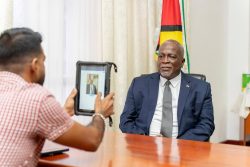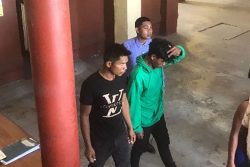Despite PNCR leader David Granger and other party members labeling the tumultuous recently-held 18th Biennial Congress a “success,” it is being viewed as a step backwards by political analysts, with Granger being seen as slow to take action to reassure supporters and the PPP as the big winner.
“I feel one step was made forward in the past six months, but the aftermath of the Congress is clearly two steps backward. The PPP and the oligarchs with connections to government contracts are the biggest winners. The PNCR congress appears to have achieved what the Rodney COI (Commission of Inquiry) could not,” economist and APNU supporter Tarron Khemraj told Stabroek News.
“While there was no violence at the Congress and the leadership has dismissed allegations of vote rigging, the firing of a gunshot and the loud protestations of disenfranchisement were the worst kind of public relations disaster for the PNCR,” former Speaker of the National Assembly Ralph Ramkarran said in his Sunday Stabroek column, which appears today.
“The PNCR congress has come and gone, but the major issues that faced the party, some of which arose at the congress itself, will have repercussions for years to come,” former Government minister Dr. Henry Jeffrey wrote in his Future Notes column in the Stabroek News.
“It is unbelievable that Granger would not see that the events surrounding the Congress elections has done damage to the party’s image in the eyes of all right thinking Guyanese,” political analyst Christopher Ram told Stabroek News. Granger’s perception on the matter is immaterial as it is the perception of the people which is paramount, he added. The question ought not to be whether damage was done, but how much, and how long the damage done will plague the party, Ram asserted.
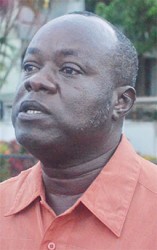
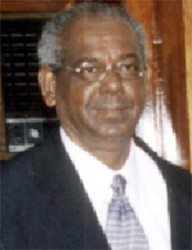
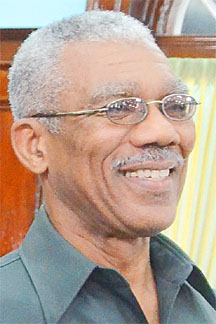
Granger has labelled the Congress – during which he was returned as party leader – a success and said that he believes that though attempts were made by a small group to tarnish the party’s image, they failed. The group Granger refers to comprises those led by Sharma Solomon and Aubrey Norton. Solomon and Norton, who were nominated to challenge Granger for the party’s leadership at the congress, have been the most vocal in making accusations of manipulation of the party’s electoral process, including the deliberate disenfranchising of party members and potential delegates from Linden, in Region 10.
Solomon pulled out of the race due to his lack of confidence in the accreditation process while Norton withdrew from the contest for similar reasons. Norton has alleged that the problems with the party’s accreditation process were manufactured to ensure Granger remained party leader. Some Lindeners, who claimed to qualify for accreditation, additionally, caused a commotion at Congress Place as they protested the situation. In the commotion which ensued, a gunshot was fired, allegedly to rescue a woman who had fallen and was being trampled.
Granger has said that the group failed to achieve its intended goal of embarrassing the party and stressed that the party’s image remains intact.
Others, however, view it differently.
Lost opportunity
Khemraj said that he cannot think of a party congress that had so much implications for Guyana’s future than the PNCR’s 18th Biennial Congress. Granger was making significant progress building up favorable public perceptions and winning hearts for APNU, which most folks see as PNCR, he said while adding that he knows of several East Indians on the cusp of support and already pledging support. However, he added, the aftermath of the Congress is clearly two steps backwards for the party. The PPP and the oligarchs with connections to government contracts are the biggest winners and the congress appears to have achieved what the Rodney COI could not, Khemraj asserted.
“The PNCR now needs to work five times harder to move away from this debacle,” Khemraj declared. He said that he felt that the party’s account of who instigated the disruptions is important and it is very detailed, clearly itemizing that the list of voting delegates was credible. “However there is always going to be substantial segment of the population who will doubt the PNCR’s response and the state media and private media of the PPP will milk the events significantly,” he said.
“Therefore, I believe something radical needs to be done right now like a possible run-off of votes. Mr Granger will have to show herculean leadership at the moment,” Khemraj asserted. He said that Granger’s credibility is not affected and he is still seen as the most honest person to become President of Guyana. “However while the ruckus did occur under his watch as leader, I don’t believe he could have anticipated the kind of nihilistic display from brothers and sisters within. I get the impression he thought the challengers understood how much was at stake for the PNCR and the country as a whole,” he said.
Meantime, Ram told Stabroek News that Granger should have ordered an investigation into the party’s elections. He said that at a time when it was necessary and expected of Granger to address the excesses of the Government and the widely expressed shortcomings of the opposition led by him, the issues surrounding the elections became the dominant event.
“Unlike past congresses, there was no post-Congress rally at the Square of the Revolution at which a report is made of the events. Instead, the party held a press conference at which it criticized its own members and the chairman of the party suggested that PNCR elections need not meet the standard of fairness, probity and transparency of national elections,” he said.
“That is the opposite of what independent voters wanted to hear from the party in general and Mr. Granger, in particular, and raises questions about the culture of the party on the question of elections. In my view, Mr. Granger threw away a wonderful opportunity to show leadership by ordering an investigation into the elections. He has to be seen therefore as affected by if not part of the problem,” he asserted.
Damaging effect


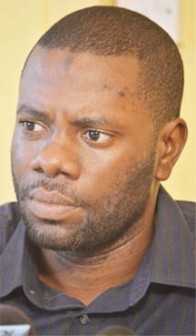
For his part, Jeffrey believes that the major issues that faced the PNCR – some of which arose at the congress itself – will have repercussions for years to come. Going into the congress, the major problem for the PNCR was the “disconnect” that has developed between the expectations of those who brought Granger to its leadership and the actual reality of his leadership, he said.
“APNU has not been able to transmit a liberating vision to its supporters or manage its relationships with them in an appropriate fashion,” he said, citing the “revolt” at the congress as an example. “Many of those who supported Mr. Granger’s 2010 leadership bid did so because they believed that, being a military man, he would have been able to provide the more militant leadership that they saw as necessary at that historical juncture. These expectations have been dashed as Mr. Granger has instead opted for an essential parliamentary strategy,” he said.
According to Jeffrey, this approach rests on the belief that if APNU is to receive political or even financial support from non-traditional supporters, it needs to at least suspend extra-parliamentary activities. “I have consistently questioned this way of thinking but this aside; it appears to me that at the operational level the party’s actions severely limit this strategy,” he said.
The former minister noted that over decades, the PPP has instilled in its traditional voters a few basic beliefs about the PNC. These were, he said, the party and its supporters are thugs and bullies, prone to high-handedness and the rigging of elections. “As if oblivious of this fact and the impact it could have on its goal of winning non-traditional support, we have been presented with an extremely acrimonious dispute surrounding the suspension of Ms. Vanessa Kissoon, the imposition of a coordinator in Linden and the manipulation of the delegates from that community that could only serve to reinforce the view that the PNCR should not be trusted with power,” Jeffrey pointed out.
He said that while the PNCR took the bold step of having open leadership elections, it did so with a mindset that wanted the propaganda value of openness while still maintaining control of the outcome of the electoral process. “History has also taught us that the greater openness there is, the less exclusion there must be, if only because opposing forces will most likely have enough support to thwart your agenda. The PNCR’s leadership wanted to have their cake and eat it, and as a result, events occurred at its congress that must have a damaging effect upon its parliamentary strategy,” he said.
Jeffrey noted too that the AFC’s proposed no-confidence motion against the government pushes APNU’s strategy that focuses on parliament to its limit, and again, it is being found wanting. “It may well be, as some believe, that the AFC, having recognised the risk-averse nature of APNU, has decided to play political brinksmanship in the hope that APNU will not support the motion, that there will be no elections and that it will benefit from the fallout of APNU supporters. This, of course, in no way means that APNU does not have to make a credible response,” he said.
However, he noted that for months, the entire opposition has been accusing the PPP/C of violating the constitution in various ways. Where the holding of local government elections is concerned, it has been claiming that the constitutional requirement to hold those elections cannot await the political convenience of the PPP/C or anyone else, he pointed out.
“How different is APNU from the PPP, when having been given the clear chance to put a stop to a regime that is violating the constitution, it meanders and even before the last congress ruckus, appears looking for an opening to scram! Is it not suggesting that upholding the constitution is also secondary to its own political fortunes? Indeed, in this respect, the political fallout at the congress might be considered something of a godsend for it provides a near perfect cover for rejecting the no-confidence approach,” Jeffrey asserted.
“The question now arises: what are we to make of APNU’s general political strategy? Not only is it refusing to take to the barricades against the PPP for violating the constitution; when it considers its electoral interest is at stake, it puts a brake on even its parliamentary approach! Added to these, its own manner of doing business severely compromises its chosen path,” he said. He added that up to now, Granger’s ideological orientation as it relates to actual governance, is not clear and the PNCR leader needs to provide greater details.
Renewed comfort for PPP
Meanwhile, Ramkarran said that the firing of a gunshot and the loud protestations of disenfranchisement at the Congress were the worst kind of public relations disaster for the PNCR. Even if the PNCR had been minded to support the proposed AFC motion of no confidence against the government, it is not now likely, he said.
“While the PNCR is in disarray and the AFC’s motion of no confidence now appearing as if it will go nowhere, the PPP’s consistent strategy gives it renewed comfort. It knows that it has a minority government and is employing every strategy to keep it functioning. It has rejected out of hand any form of coalition. It intends to stay in office for as long as possible. Whenever this is no longer possible, it will dissolve the National Assembly and call elections, which the PPP/C believes it will win. This is a fixed strategy from which it is not deviating. It has been paying dividends in terms of retaining office,” the former PPP stalwart noted.
Ramkarran stated that the opposition’s agenda in the meantime, if it was ever coherent one in the first place, has fizzled out. “It has rejected major infrastructural work such as the Amaila Hydroelectric Project and the Airport Project for no good reason. It has been forced to support enough of the budget to keep the Government alive. Those portions that it rejects, the Government implements anyway by spending sums not initially approved. The bills that it has passed have not been assented to by the President. Its parliamentary resolutions have been ignored. The Public Procurement Commission has not been appointed. The AFC’s no confidence motion appears stillborn. Apart from voting down the Government in the National Assembly, it now has no other strategy,” he said.
The former Speaker said that the opposition now has the challenge of devising a new strategy. “Enormously popular, with a great mobilizing capacity, would be the call for national unity through a coalition government, if placed at the top of its political agenda. It must have dawned on the Opposition, and all Guyana by now, that full emancipation and liberation cannot be achieved unless all are fully represented in and have a stake in the governance of Guyana,” he said.
Ramkarran stated that the opposition must know that the majoritarian impulse in liberal democratic theory is obstructive of the ‘legitimate expectation(s)’ of large minorities in any country. “If one section of Guyana feels excluded from governance, the other section(s) is insecure and the whole of Guyana is destabilised. We experienced just that in the 1970s and 1980s,” he said.
“After all these decades during which the ‘legitimate expectation(s)’ of the Guyanese people has been thwarted, it is not now going to be a gift from anyone and is not going to be met without a large scale, national and sustained struggle. The demand for a system of governance in Guyana which empowers all Guyanese must be elevated squarely onto the top of the political and civic agenda as the dominant political and civic issue of the day facing Guyana, requiring a united, national effort,” he asserted.




